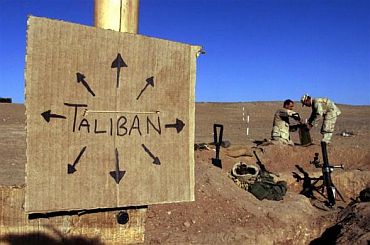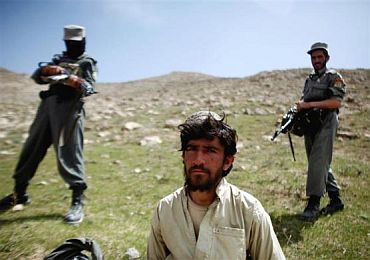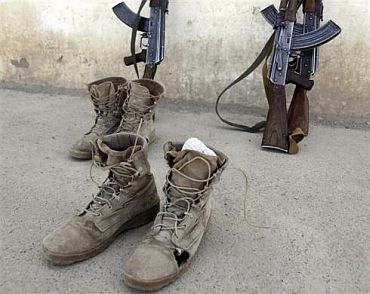Photographs: Jim Hollander/Reuters
Afghanistan's Taliban have been wrongly perceived as close ideological allies of Al Qaeda and they could be persuaded to renounce the deadly global terrorist group, American scholars say.
According to a report by the New York University, there was substantial friction between the groups' leaders before the 9/11 attacks and that hostility has only intensified.
The prevailing view in Washington, however, is "that the Taliban and Al Qaeda share the same ideology," said Tom Gregg, a former United Nations official in Afghanistan and a fellow at the Centre on International Cooperation at NYU, which is publishing the report.
'Taliban's focus is on Afghanistan'
Photographs: Goran Tomasevic/Reuters
"It is not an ideology they share; it is more a pragmatic political alliance. And therefore a political approach to the Taliban ultimately could deliver a more practical separation between the two groups," he was quoted as saying by the New York Times.
"Al Qaeda is an organisation that has a clearly articulated vision of global jihad, and that is not the case with the Haqqanis and the Taliban," Gregg said.
"Their focus is on Afghanistan, the country they are from," says the report.
The report argues that Taliban leaders did not know of the September 11 attacks in advance and that they appeared to have been manipulated by Al Qaeda chief Osama bin Laden, who then lived in Afghanistan.
'The conflict may escalate'
Photographs: Lucy Nicholson/Reuters
The report, Separating the Taliban from Al Qaeda: The Core of Success in Afghanistan cautions that the US-led military campaign may make it harder to reach a settlement in Afghanistan.
It says attacks on Taliban commanders and provincial leaders will leave the movement open to younger, more radical fighters and will give Al Qaeda greater influence. The authors suggest that the US should engage older Taliban leaders before they lose control of the movement.
They do not oppose North Atlantic Treaty Organisation's war, but suggest that negotiations should accompany the fighting. A political settlement is necessary to address the underlying reasons for the insurgency, they write. Otherwise, they warn, the conflict will escalate.




article